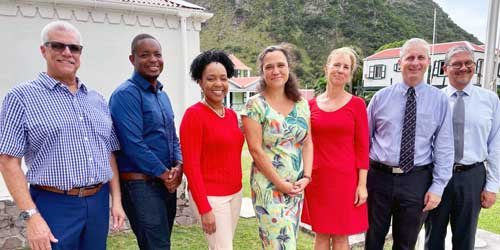A three-member delegation, appointed by the Ministry of the Interior and Kingdom Relations (BZK), which is assessing the possible introduction of “Equal Treatment Legislation” in the Caribbean Netherlands visited Saba last week for talks with authorities and stakeholders.

The delegation, headed by former Bonaire Island Governor Glenn Thodé, spoke with the Island Council, Executive Council, policy advisors and management of the Public Entity Saba, the Community Development Department, Saba Cares, Body, Mind & Spirit (BMS), police and the Saba Comprehensive School (SCS) about the anti-discrimination legislation that is being considered for the islands.
The aim of the three-day visit was to exchange views about the occurrence of discrimination in the community and the way in which this legislation can help to remedy this. “We are assessing the forms of equal and unequal treatment on the islands. What kind of discrimination issues are there, what are the needs, and how we can find useful solutions together,” said Thodé, who mentioned that setting up a local Reporting Point for victims of discrimination is also being considered.
“We also talked about having the Netherlands Human Rights Institute carry out the legal judgment in equal treatment cases on the islands. The institute already does this in the Netherlands but never received the mandate to do so on the islands,” explained delegation member Suzanne Vogel-Koelman of the Ministry of BZK.
Burden of proof
“We also explain what the legislation entails, what resorts under it, and what doesn’t. One of the benefits of the laws, when they are implemented, is the so-called shift in the burden of proof to the defendant. That means that when facts indicate discrimination, the defendant needs to prove otherwise, instead of the victim having to prove a case of discrimination,” said delegation Barbera Veltkamp of the Ministry of BZK.
The right to equal treatment and the prohibition to discriminate, guaranteed in article 1 of the Dutch Constitution and in international treaties such as the European Human Rights Convention, also applies to the Caribbean Netherlands. However, the equal treatment laws are currently not in effect for the islands because of an agreement in 2010 not to introduce all Dutch legislation for Saba, St. Eustatius, and Bonaire.
Protection against discrimination
This is changing with the comply-or-explain principle to introduce Dutch legislation on the islands unless there are good reasons not to do so. Also, in May 2022, the Island Governors of Bonaire and Saba, and the Statia Government Commissioner asked for the introduction of legal protection against discrimination and to have equal treatment legislation implemented as soon as possible. The Netherlands Human Rights Institute and the National Coordinator against Discrimination and Racism have also explicitly called for this.
The BZK Ministry started looking at the possibilities to introduce equal treatment laws in the Caribbean Netherlands and installed the committee chaired by Thodé. From November 1 to 13, the delegation subsequently visited Bonaire, Saba, and St. Eustatius. The next steps in the process will be taken based on the findings of the delegation and in consultation with the islands.
Four laws
The start of the legislative process may start as soon as the first quarter of 2023. It concerns four laws: the General Equal Treatment Law, the Equal Treatment Law on grounds of Disability of Chronic Illness, the Equal Treatment Law for Men and Women, and the Equal Treatment Law on the ground of Age in Employment.
Having the support of the community in the process is vital, said Thodé. “It is important that people understand what this legislation can do for them before the new laws are introduced. That is why we not only speak with authorities but also with NGOs and residents to get their feelings, their concerns, and wishes.”
GIS Saba
 Saba News News and Information from Saba Island, Dutch Caribbean
Saba News News and Information from Saba Island, Dutch Caribbean